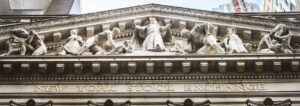Let discipline guide you through the market’s ebbs and flows, not headlines
Although stock markets around the world were more volatile at the end of the 3rd quarter, most of the damage was done to the cyclical and small cap sectors of the markets, as can be seen in the following table:
| 3rd quarter* | Year to date* | |
|
– 2.93% | +4.78% |
|
– 1.94% | +1.60% |
|
– 6.46% | +2.29% |
|
– 10.12% | +1.54% |
|
– 5.75% | +6.82% |
* to October 10, 2014
As markets continue to decline, investors are wondering whether these are corrections or full blown bear markets.
Obviously, global unrest and uncertainty are the main culprits. Lots of headline news has contributed to these ups and downs: lower energy prices, a stronger US dollar, a sluggish EU economy, slower growth in China, a belligerent Russia in Ukraine, the barbarian acts of the terrorists in The Islamist State, the Hong Kong students’ protests reminiscent of Tian An Men Square back in 1989, the Ebola outbreak in West Africa and the few cases that ended up in the US and Spain, and many more events.
Truth be told, we have no idea whether any of these events have played a role in the recent market corrections. Furthermore, we do not know whether these events are not just noise nor can we directly quantify their impact on the global economy if they are not. However, they can be seen as good excuses for a long overdue correction, this after a five-year climb from the abyss of the 2009 financial crisis.
As we have mentioned in the last 2 letters, it has become more difficult to pick good companies at reasonable prices. Therefore, we, as stock pickers, welcome an “adjustment” in the valuation of equities (the bigger the adjustment, the better it is; and yes, it does sound masochist but that is how the investment process works). Global stress always creates opportunities as more companies meet our investment criteria. It allows us to either buy more of the companies we already own or add new companies that we have been waiting for better entry prices. As Warren Buffett recently said (and we are paraphrasing here), for investors who have funds to deploy, lower prices are a God sent. For those who are leveraged (i.e. on margin), it is a different story.
*************************************************
Most investors have surely heard the adage “Buy low, sell high”, the four magic words that makes investing so simple. What is neither understood nor taught is the psychological makeup one must have to be able to do this, for example:
- In order to buy low and sell high, you cannot follow the herd;
- You have to think for yourself, have the discipline and temperament to resist your impulses;
- You have to tune out the prevailing views and opinions you hear on the radio, television and the internet.
In our honest opinion, it is very difficult and improbable (not impossible) for most people to follow the 3 points just mentioned. Human beings are wired with the wrong instincts when it comes to investing.
- We are social animals, i.e. we like to belong to a herd;
- We like our opinion to be confirmed by others;
- Thus, we look for confirmation where ever we can find, whether it’s from friends, the media, “investment gurus” or anyone else who agrees with us;
- Worse, we dismiss any opinions that are contrary to ours.
Wall Street and Bay Street are tricky places – with the internet, everyone seems to know everything. Yet intuitively, this cannot be true, otherwise everybody would be rich. Does anybody ask themselves how much of what they read on the internet are facts? Or are they just opinions? Or maybe worse, very well thought out marketing schemes to get investors to “act” (trade) often? Let us not forget that large volumes of transactions are the bread and butter of the banks and investment firms (i.e. commissions, spreads between buys and sells etc…).
It is when we can recognize these “mental flaws” that we can:
- Resist the urge to buy in a rally and sell into a decline;
- Start thinking independently, understanding and analyzing the facts and thus create our own opinion;
- Identify areas where we can have an edge.
Ben Graham once said “the stock investor is neither right nor wrong because others agreed or disagreed with him; he is right because his facts and analysis are right’’. At Claret, we continue to work hard at understanding and properly analyzing the facts.
*************************************************
At Claret, although we do not make market forecasts or market timing calls, we do follow some statistics relating to market valuation in general. One of them is obviously interest rates, both short term and long term, as well as government and corporate.
Two facts come out from our analysis:
- The low level of interest rates today can easily justify a higher valuation for equities in general: it allows corporations to borrow at cheap rates and purchase their common shares at reasonable valuations (thereby pushing stock prices higher). It also forces investors seeking a higher level of income to look for high dividend opportunities in the equity markets (also pushing stock prices higher).
- Since 1954, there has been no major market correction (defined as a 15% decline or more) without interest rate going up, except for one. Preceding every decline of 15% or more, the 3-month treasury rate has gone up, sometimes quite dramatically. The exception where this outcome did not apply is the 15.50% correction in 1998 caused by the debacle of Long Term Capital Management (hedge fund).
This brings us to one big worry: derivatives. If we have to worry at all, it is all these financially engineered vehicles that the banks and hedged funds still carry on their balance sheets which nobody really knows what they’re worth. As Warren Buffett wrote way back in the early 2000s, these are “weapons of mass destruction” because as markets rise along with speculation, these instruments will go from “marked-to-market” to “marked-to-myth” in order to justify the big bonuses that bankers and hedged funds managers pay themselves. These vehicles allow wide speculation from all types of investors: we should remember that thanks to the highly creative, insurance schemes not requiring any reserves to be held concocted by AIG and the likes (through the use of derivatives), home buyers with almost no income could borrow huge amounts of money, buy expensive houses, wait for prices to go up, sell them and buy even bigger ones. House prices went up to unrealistic levels and one day, the trend reversed. The glut of unpaid mortgages forced AIG into bankruptcy, destroyed some financial institutions’ balance sheets and almost blew up the global economy in 2008-2009. We need to be vigilant and put the players in high surveillance via regulation. For now, there is no sign of any leveraged, speculative bubble that could potentially create a major dislocation in the economy but one day, there will be.
The Claret team







